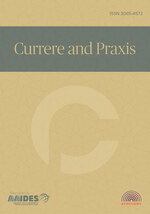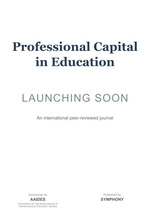Pasolini, public pedagogy, subjective presence
DOI:
https://doi.org/10.70116/298027414Keywords:
Pasolini, public pedagogy, subjective presenceAbstract
In this paper, I invoke the post-World-War-II Italian public intellectual Pier Paolo Pasolini, juxtaposing Pasolini’s public pedagogy – his subjective presence always attuned to the historical moment - with a 2013 essay composed by contemporary U.S. scholars Jake Burdick and Jennifer Sandlin, who perform what I term discursive engineering, dismissing canonical concepts of education (without argument or evidence), apparently fantasizing that by changing what we say we can change the world. Alas, Pasolini knew better. No securely tenured professor, Pasolini risked his life to teach the Italian public, calling out the catastrophic path humanity has taken, specifically substituting virtuality for actuality, technologization that we imagine leaves us immune to the consequences of unbridled capitalism. Focused on Pasolini’s unfinished novel Petrolio (petroleum or crude oil) and a 2014 film focused on the final few days before Pasolini was assassinated, I conclude this curricular juxtaposition hoping to carve out what Tetsuo Aoki termed a generative space of difference, wherein we might re-experience – even reactivate – an earlier anthropological moment when we were still – sort of – “human.”
Downloads
References
Aoki, T. (2005 [1995)]. In the midst of doubled imaginaries: The pacific community as diversity and as difference. In W. F. Pinar & R. L. Irwin (Eds.), Curriculum in a new key (pp. 303-319). Lawrence Erlbaum.
Benini, S. (2015). Pasolini: The sacred flesh. University of Toronto Press.
Bondavalli, S. (2015). Fictions of youth: Pier Paolo Pasolini, adolescence, fascisms. University of Toronto Press.
Braucci, M. (2019). Pasolini embodied: Interview with Willem Dafoe. In L. Peretti & K. T. Raizen (Eds.), Pier Paolo Pasolini, framed and unframed: A thinker for the twenty-first century (pp. 223-226). Bloomsbury Academic.
Burdick, J., & Sandlin, J. (2013). Learning, becoming, and the unknowable: Conceptualizations, mechanisms, and process in public pedagogy literature. Curriculum Inquiry 43(1), 142-177.
Egan, K. (1992). Imagination in teaching and learning. University of Chicago Press.
Forgacs, D. (2019). Dirt and order in Pasolini. In L. Peretti & K. T. Raizen (Eds.), Pier Paolo Pasolini, framed and unframed. A thinker for the twenty-first century (pp. 11-34). Bloomsbury Academic.
Garofalo, D. (2019). Television, neo-capitalism, and modernity: Pasolini on TV. In L. Peretti & K. T. Raizen (Eds.), Pier Paolo Pasolini, framed and unframed. A thinker for the twenty-first century (pp. 159-175). Bloomsbury Academic.
Greene, M. (1995). Releasing the imagination. Jossey-Bass.
Greene, N. (1990). Pier Paolo Pasolini: Cinema as heresy. Princeton University Press.
Huang, K. (2023, January 17). A. I. Is doing homework. Can it be outsmarted? The New York Times, CLXXII, No. 59,671, A1, A16.
Kindley, E. (2023, March 9). Departments on the Defensive. The New York Review of Books, LXX (4), 19-21.
Luisetti, F. (2019). Pier Paolo Pasolini’s political animism. In L. Peretti & K. T. Raizen (Eds.), Pier Paolo Pasolini, framed and unframed. A thinker for the twenty-first century (pp. 211-220). Bloomsbury Academic.
Mervosh, S. (2022, September 1). Pandemic set schools back two decades. The New York Times, CLXXI, No. 59, 533, A1, A15.
North, M. (2018). What is the present? Princeton University Press.
Peretti, L., & Raizen, K. (2019). Introduction to Pier Paolo Pasolini, framed and unframed. A thinker for the twenty-first century (pp. 3-9). Bloomsbury Academic.
Pinar, W. (2009). The Worldliness of a cosmopolitan education. Routledge.
Pinar, W. (2015). Educational experience as lived: Knowledge, history, alterity. Routledge.
Pinar, W. (2019a). Moving images of eternity: George Grant’s critique of time, teaching, and technology. University of Ottawa Press.
Pinar, W. (2019b). What is curriculum theory?. Routledge.
Pinar, W. (2023). A praxis of presence in curriculum theory. Routledge.
Pinar, W., Reynolds, W., Slattery, P., & Taubman, P. (1995). Understanding curriculum. Peter Lang.
Pinkus, K. (2019). Pasolini for the anthropocene. In L. Peretti & K. T. Raizen (Eds.), Pier Paolo Pasolini, framed and unframed. A thinker for the twenty-first century (pp. 195-210). Bloomsbury Academic.
Rohdie, S. (1995). The Passion of Pier Paolo Pasolini. Indiana University Press.
Roose, K. (2023, January 13). A.I., Once the Future, has become the present. What do we do now? Some educators fear ChatGPT will be used for cheating, but others see it as a teaching tool. The New York Times, CLXXII, No. 59,667, B1, B5.
Ryan-Scheutz, C. (2007). Sex, the self, and the sacred: Women in the cinema of Pier Paolo Pasolini. University of Toronto Press.
Salecl, R. (2021). Corona envy and the violence of the pandemic. In E. Degot & D. Riff (Eds.), There is no society? Individuals and community in pandemic times (pp. 89-106). Verlag.
Sartarelli, S. (2014). Pier Paolo Pasolini: A life in poetry. In Stephen Sartarelli (Ed.), The selected poetry of Pier Paolo Pasolini. A bilingual education (pp. 1-58). University of Chicago Press.
Schwartz, D. (1992). Pasolini requiem. Pantheon.
Sengupta, S., Einhorn, C., & Andreoni, M. (2021, March 12). A global plan to conserve nature is lacking a vital ingredient. The New York Times, CLXX, No. 58,995, A13.
Specia, M. (2023, January 18). Reading, writing, arithmetic and air raid sirens. The New York Times, CLXXII, No. 59,672, A6.
Temelkuran, E. (2021). Reinventing the politics of friendship in a “post-society”: Spinoza’s cloak and my cardigan. In E. Degot & D. Riff (Eds.), There is no society? Individuals and community in pandemic times (pp. 75-86). Verlag.
Testa, B. (1994). To film a gospel.... and Advent of theoretical stranger. In P. Rumble & B. Testa (Eds.), Pier Paolo Pasolini: Contemporary perspectives (pp. 180-209). University of Toronto Press.
Viano, M. (1993). A certain realism: Making use of Pasolini’s film theory and practice. University of California Press.
Williams, E. (2019). The loss of the separated world: On Pasolini’s communism. In L. Peretti & K. Raizen (Eds.), Pier Paolo Pasolini, framed and unframed. A thinker for the twenty-first century (pp. 129-155). Bloomsbury Academic.
Downloads
Published
How to Cite
Issue
Section
License
Copyright (c) 2023 Symphony

This work is licensed under a Creative Commons Attribution 4.0 International License.














